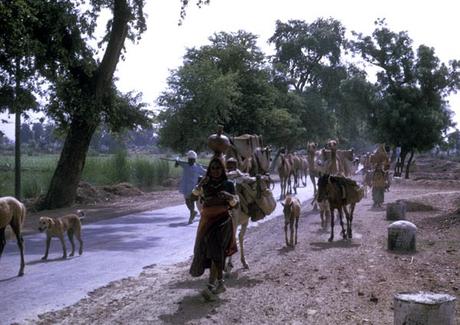
Roadside scene, India
The following is an excerpt from the memoir of Carolyn T. Arnold, my husband’s aunt, who traveled to India in the 1960s.On my first tour of India the itinerary called for a drive in cars as we toured northern India. The idea was a good one except in July the usual range of heat is from 100 to 117 degrees, and the humidity goes up to 75%. We saw much of village life, more than was intended, as the old cars broke down repeatedly. Daniel, our driver, was the only mechanic, so we all had to stop while he went back to fix the car.
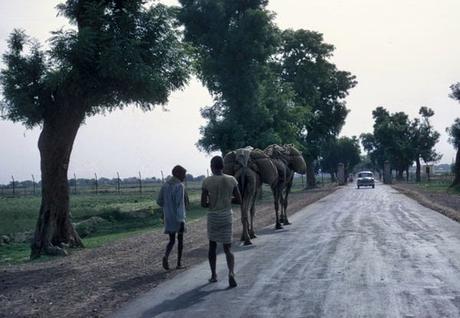
On the road in India
Before we left, I had asked if the roads were paved and was assured they were. True enough, one strip down the middle of the road was covered with asphalt. When meeting another vehicle, both had to swing out to the wide shoulders, stirring up clouds of choking yellow dust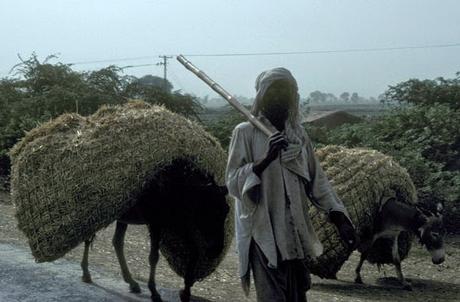
Man with laden donkeys
On the roads of India, one can see almost any kind of transportation from man-drawn rickshaws, to camels, to trucks, and worn out buses, and always cows. They are allowed to go anywhere without harm, wandering in and out of traffic, which is hectic even without the cows. At one point on our journey, several carts, with two large wheels, creaked along as the oxen lumbered by.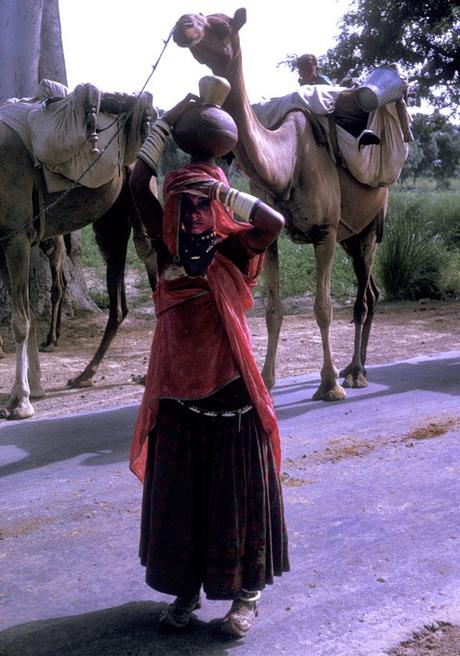
Gypsy woman
Then a band of gypsies and their camels came along. The women carried jugs of water on their heads while their long, red skirts were swinging and their bracelets and necklaces were jingling. Small babies rode in pouches on either side of the camels.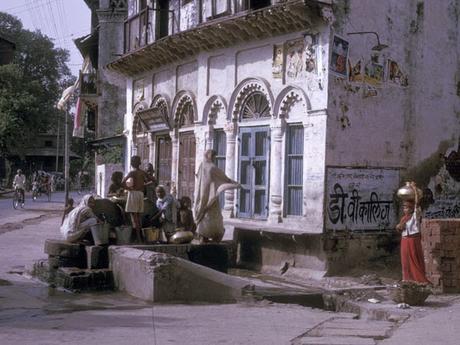
Women at the village well
We saw elephants, water buffaloes, and women at the village water well. The women seemed to be engaged in local gossip. Leaning against the outer wall of a building was a charpoy, which is a bed made of a wooden frame with web straps woven alternately in and out and fastened to the frame. It didn’t have a pad or mattress. We could easily understand why it was cooler to eat, sleep, and work outside then inside a building. We saw a barber at work, his customer sitting on a piece of cloth spread on the grass in the shade. I learned later that families of a higher class also sleep on the flat roofs of their homes during the extremely hot weather.Perhaps the original intrepid tourist was Carolyn T. Arnold, my husband’s aunt. A single school teacher in Des Moines, Iowa, she began traveling abroad when she was in her forties, beginning with a bicycling trip through Ireland in 1952. She went on from there to spend a year as a Fulbright Exchange Teacher in Wales, to more trips to Europe and beyond, and eventually became a tour leader, taking all her nieces and nephews (including Art) on her travels. When she retired from teaching, she wrote of her experiences in a memoir called Up and Down and Around the World with Carrie. Today, as I read of her travels, I marvel at her spirit of adventure at a time when women did not have the independence they do today. You can read of some of her other adventures in these posts on this blog: October 21, 2013; October 7, 2013; July 29, 2013.March 10, 2014, January 12, 2015.
